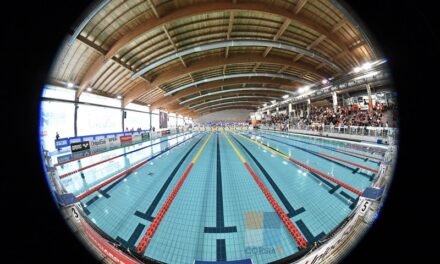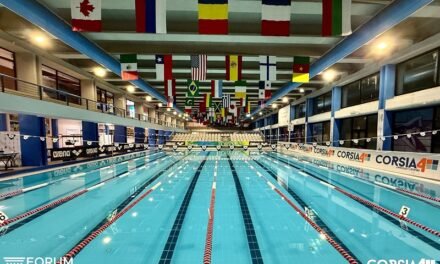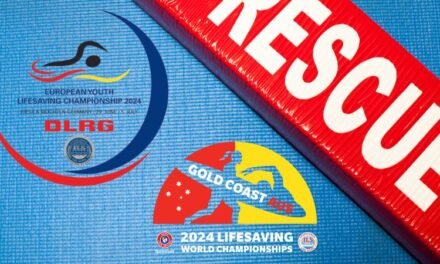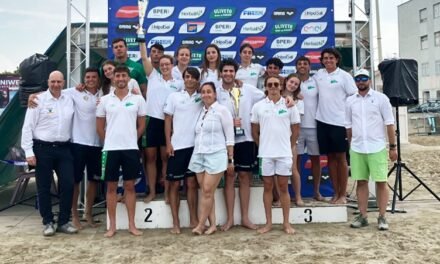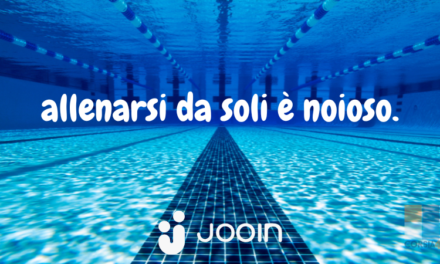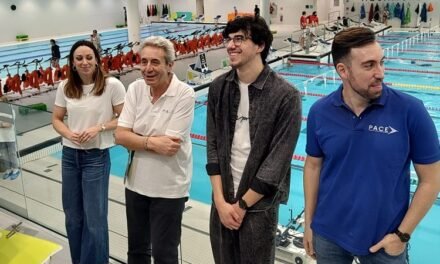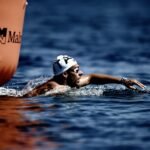by Gianna De Santis
If you see her swimming it takes just seconds to realize the power of her stroke, how she’s able to own the pool and at the same time be a friend of the water. Sometimes she goes so fast that she doesn’t just dominate the race and her competitors, but even the videocameras have to chase her, and they have to zoom out because there’s a huge gap between her and the others: an abyss. For example? Just look at the 200 medley that she won in Eindhoven in 2013 as part of the World Cup circuit where she broke the world record.
This is a portrait of Katinka Hosszu, born in 1989, Hungarian, with a degree in psycology, who seems like an “Iron Lady” of the water (this is how she’s been nicknamed, and it’s also the title of her book that’s coming out on November 22nd in Hungary and that will soon have an English version). When she takes off her cap and goggles she shows us two icy eyes, but then her face opens up with the sweetest smile.
Katinka is the Iron Lady who has three gold medals and three bronzes at the Long Course World Championships; two silvers and a bronze at the Short Course World Championships,; nine golds, four silvers and two bronzes at the European Long Course Championships; four golds, three silves and two bronzes in the European short course; and incredibly 103 golds, 23 silvers and 23 bronzes on the World Cup circuit. These numbers will give you shivers, yet she is used to continually testing her limits – and passing them. The next hurdle to jump is the Olympic Games, which she has never won.
We’ve seen your great successes at the last four World Cup stages, are you satisfied or are you still determined to go on winning?
“ I’m very happy with the results that I’ve obtained so far,” says Katinka Hosszu, “Obviously I’m still very determined to reach the new goals that are important to me. Right now I’m concentrating on the next stage of the World Cup and I’m looking forward to competing again.”
In this World Cup, the Hungarians and you especially are demonstrating your excellent preparation: what’s your secret?
“ I can’t say that there’s a secret, exactly,” she explains, “but it’s just the hard work that you do every day which gives you results in the end. I’m training differently than my compatriots and I’m competing more often than them, but I’m happy that more and more Hungarians are participating in the World Cup. All of this is very encouraging, and I hope that, thanks to the quality of the Hungarian professional swimmers, the level will get even higher.”
Are you ready for the World Championships in the short course in Doha?
“I’m preparing carefully, so far I’ve had a good season in the short course and I’m interested in seeing how my events will go at the World Championships. I’m happy to be going back to Doha where, in September, I broke three world records. It’s pleasant to go back to a pool where I have a lot of great memories, it’s stimulating.”
At the Olympics you’ve never been able to win, do you think that Rio will be the decisive year? Is that one of your objectives for this season?
“It’s difficult to forsee who will win in Rio. Certainly one of my objectives is to be on the podium and to take home a medal, but I’m not fixated on winning at any cost. At any rate, I already feel quite happy about the way my career has progressed even if I haven’t won an Olympic medal, I still have fun when swimming and I give my best effort. We’ll see about the rest.”
Isn’t it tiring to go around the world all year for the championships and other international events?
“Of corse it isn’t easy, but at this point in my life I like it and I have fun, I travel a lot and I compete even more, It’s surely a tiring and busy lifestyle but I’m completely enjoying being a professional swimmer. It’s worth it.”
In Italy many athletes are going abroad to train, what do you think of the choice to try an experience outside of your home country?
“When I was 19 years old I moved to Los Angeles to study and I came back to Hungary after four years for the London Olympics (2012) so I can confirm from my personal experience that it opens your mind. They gave me new ideas and a lot of confidence from seeing how people from many different countries were training, so it’s a experience you should have and I recommend it. But coming back home is great. I’m aware that I learned a lot from this experience, but I’m also convinced that from here I can give the best representation of my country.”
Breaststroke is perhaps the stroke that shows you have a weakness, how do you try to manage this little problem?
Sincerely, the breaststroke isn’t as much of a problem for me now as it was in the past, it’s my weakest stroke, true, but I think that’s I’ve worked enough on this lack for all of the medley races.
Let’s talk about your book, “the Hungarian Iron Lady.” Where does the desire to tell your story come from? To tell others about the secrets of your success?
“Honestly I hope that this book will inspire at least one person. I’ve told my story, even if it’s not a biography, hoping to motivate others. It’ll be a psycological book, telling how I became the “Iron Lady” and why they gave me this nickname. It will talk about my experiences at the London Olympics where I finished fourth, and in Barcelona, what happened that year, what has changed and how I view it today, because it was a transformation.”
Is the nickname “the Iron Lady” a burden or an incentive during the races?
It’s been two years since they gave me this nickname. Now it makes me feel confident, even if at the beginning I felt I wasn’t good enough, but now I believe that it suits me and I hope to deserve it in the future as well. Now, being on the starting block as the Iron Lady gives me a different preparation, motivating me to always compete at my best and to also do more.”
It’s couldn’t be any different for someone who looks for an ever higher hurdle to jump over every time she dives in the pool, another boundary to cross, another record to break. The nickname Iron Lady isn’t by chance!
(special thanks to Anitha Iablonschi)
(translation by: Megan Kilbourn)
(photo credit: pentaphoto & LaPresse)




